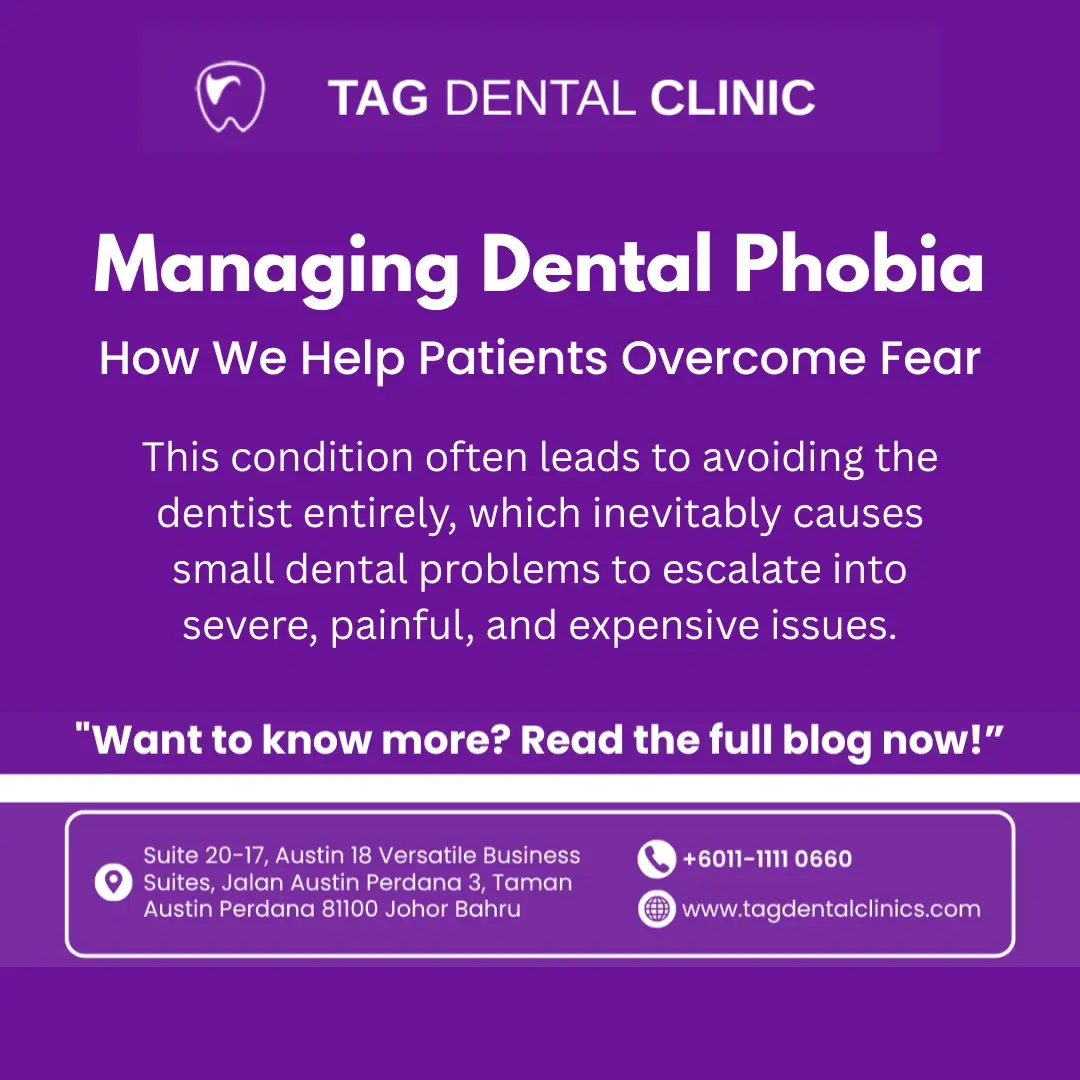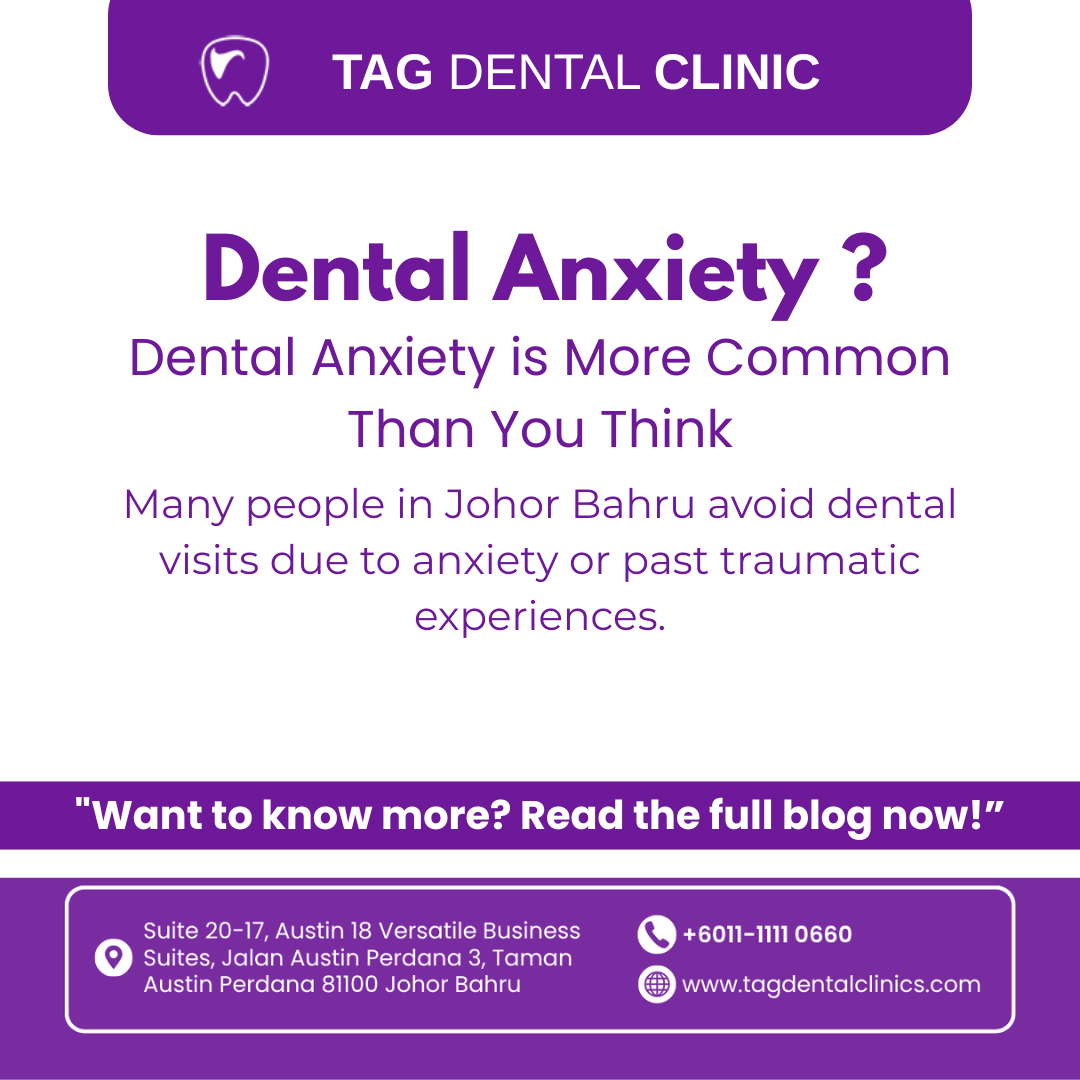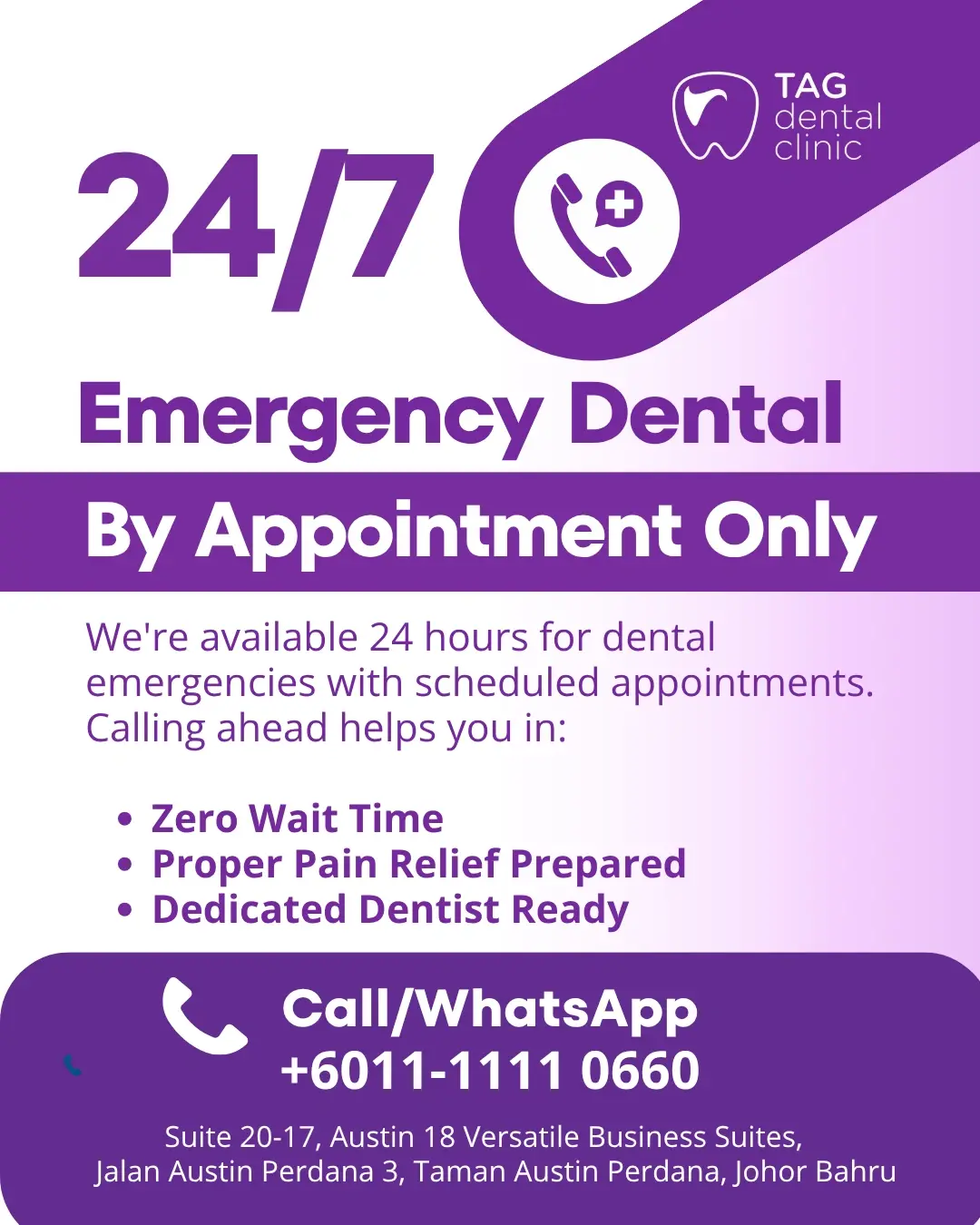Managing Dental Phobia: How We Help Patients Overcome Fear at TAG Dental Johor Bahru
Table Of Content

The Invisible Barrier: Understanding the Roots of Dental Phobia
For many people, dental appointments are a source of mild anxiety. For others, it’s a paralyzing fear known as dental phobia or odontophobia. This condition often leads to avoiding the dentist entirely, which inevitably causes small dental problems to escalate into severe, painful, and expensive issues.
At TAG Dental in Johor Bahru, our philosophy is that no one should sacrifice their health due to fear. Overcoming dental phobia starts with understanding its psychological roots:
- Past Traumatic Experiences: The most common cause is a negative experience in childhood or an unusually painful procedure as an adult. The brain connects the dental environment (sounds, smells, reclining chair) with pain or a feeling of helplessness.
- Fear of Pain (Algophobia): A deep-seated belief that all dental work will be painful, often fueled by dramatic media portrayals or outdated clinical methods.
- Loss of Control: Being reclined with instruments in your mouth can trigger a feeling of vulnerability and helplessness, which is highly anxiety-inducing for many.
- Gag Reflex: A hyperactive gag reflex can be a source of profound embarrassment and physical discomfort, causing patients to dread any procedure that involves placing instruments in the back of the mouth.
Our Strategy: Sedation and Behavioral Techniques for Comfort

Overcoming dental phobia requires a personalized, multi-pronged approach that addresses both the psychological fear and the physical sensations. At TAG Dental, we integrate comfort and expertise into every visit.
1. Conscious Sedation Options
Sedation dentistry allows patients to reach a state of deep relaxation while remaining conscious and able to respond to commands, making the experience feel short and stress-free.
- Oral Sedation (Pills): The patient takes a prescribed pill (usually a benzodiazepine) before the appointment. This results in significant drowsiness and deep relaxation. Patients often remember little to nothing of the procedure.
- Nitrous Oxide (Laughing Gas): A mild form of inhalation sedation. The gas is inhaled through a small mask and produces a feeling of euphoria, calmness, and slight numbness. The effects wear off within minutes after the mask is removed, allowing the patient to drive themselves home shortly after.
2. Behavioral and Communication Techniques
Our team is trained to recognize and manage dental anxiety through simple, direct, and reassuring actions.
- Stop Signal: We establish a clear, non-verbal stop signal (like raising a hand). This immediately returns control to the patient, assuring them that they can halt the procedure at any moment, which dramatically reduces anxiety.
- Incremental Exposure: For anxious patients, the first appointment may involve nothing more than a simple chat, a visual examination, and maybe a digital scan—no drilling. We build trust and slowly increase the complexity of treatment over time, letting the patient set the pace.
- Clear Communication: We explain every step before it happens, using simple language. We never surprise the patient, eliminating the fear of the unknown.
3. Topical and Local Anesthesia
Fear of the injection is common. We use powerful topical numbing gels applied before the local anesthetic is administered, ensuring that the patient barely feels the initial pinch. We administer the local anesthetic slowly and gently, prioritizing patient comfort.
Tips Patients Can Use to Prepare for Their Visit

You are the most important partner in managing your fear. Here are specific steps you can take before and during your appointment to ensure a successful, anxiety-free experience:
- Be Honest About Your Fear: When booking your appointment with TAG Dental, immediately tell the receptionist and your dentist that you experience anxiety or phobia. This allows the team to allocate extra time and prepare the necessary comfort measures (e.g., sedation).
- Schedule Smart: Choose an appointment time when you are less rushed and stressed, such as early in the morning.
- Use Distraction: Bring your own headphones and listen to a podcast, music, or an audiobook during the procedure. Focusing your attention elsewhere is highly effective.
- Practice Deep Breathing: Use controlled, rhythmic breathing techniques (e.g., breathe in for four seconds, hold for four, exhale for six). Deep breathing activates the parasympathetic nervous system, which naturally counteracts the body’s "fight or flight" stress response.
- Bring a Comfort Item: If a blanket, small pillow, or even a fidget toy helps you relax, bring it along.
- Avoid Caffeine: On the day of your visit, avoid coffee and highly caffeinated drinks, as they naturally amplify anxiety and nervousness.
- Ask for the Stop Signal: Confirm with your dentist that a signal has been established before the procedure begins. Knowing you have control is paramount.
Frequently Asked Questions (FAQs) About Managing Dental Fear
%20About%20Managing%20Dental%20Fear.webp)
1. Is dental phobia rare? No. While severe phobia is less common, a significant percentage of the population experiences moderate to severe anxiety regarding dental visits. You are not alone.
2. Can sedation make me sick? Nitrous oxide (laughing gas) is very safe and rarely causes nausea. Oral sedation, when properly dosed, is also highly effective with minimal side effects, but you will need someone to drive you home.
3. Does the gag reflex make some procedures impossible? No. While a hyperactive gag reflex is challenging, it can usually be controlled effectively using nitrous oxide, topical anesthetics applied to the back of the throat, or, in some cases, oral sedation.
4. Will my dentist judge me if I haven't been in years due to fear? Absolutely not. At TAG Dental, we are here to help, not judge. We understand that avoiding the dentist is a symptom of the phobia, and our primary goal is to address your fear first.
5. How long does it take for oral sedation to wear off? The full effects of oral sedation can last for several hours, which is why a trusted escort is mandatory for driving you home and monitoring you until the medication wears off completely.
6. Can I try nitrous oxide just for a cleaning? Yes. Nitrous oxide is often used for simple procedures like deep cleanings to ensure the patient is comfortable and relaxed.
7. Is the pain stop signal rude? On the contrary, the stop signal is a professional tool that is highly encouraged. It builds trust and makes the procedure easier for both the patient and the dentist.
8. Will insurance cover sedation? Coverage varies greatly depending on your insurance provider and the type of sedation. We recommend checking your policy details or discussing this with our administration team in Johor Bahru prior to treatment.
9. Can I bring a friend or family member into the treatment room? In many cases, yes. Having a familiar, calming presence nearby can significantly reduce anxiety. Please discuss this request with us beforehand.
10. What is the most important thing I can do to start my journey? Call and book an initial consultation that is just for talking and planning. Commit to that first low-stress meeting.
Conclusion:

At TAG Dental in Johor Bahru, we view managing your fear as important as managing your dental health. We offer a safe, empathetic environment where your comfort is our priority. If dental anxiety has kept you from the care you need, take the courageous first step and contact us today—we are ready to guide you to a relaxed and healthy smile.





